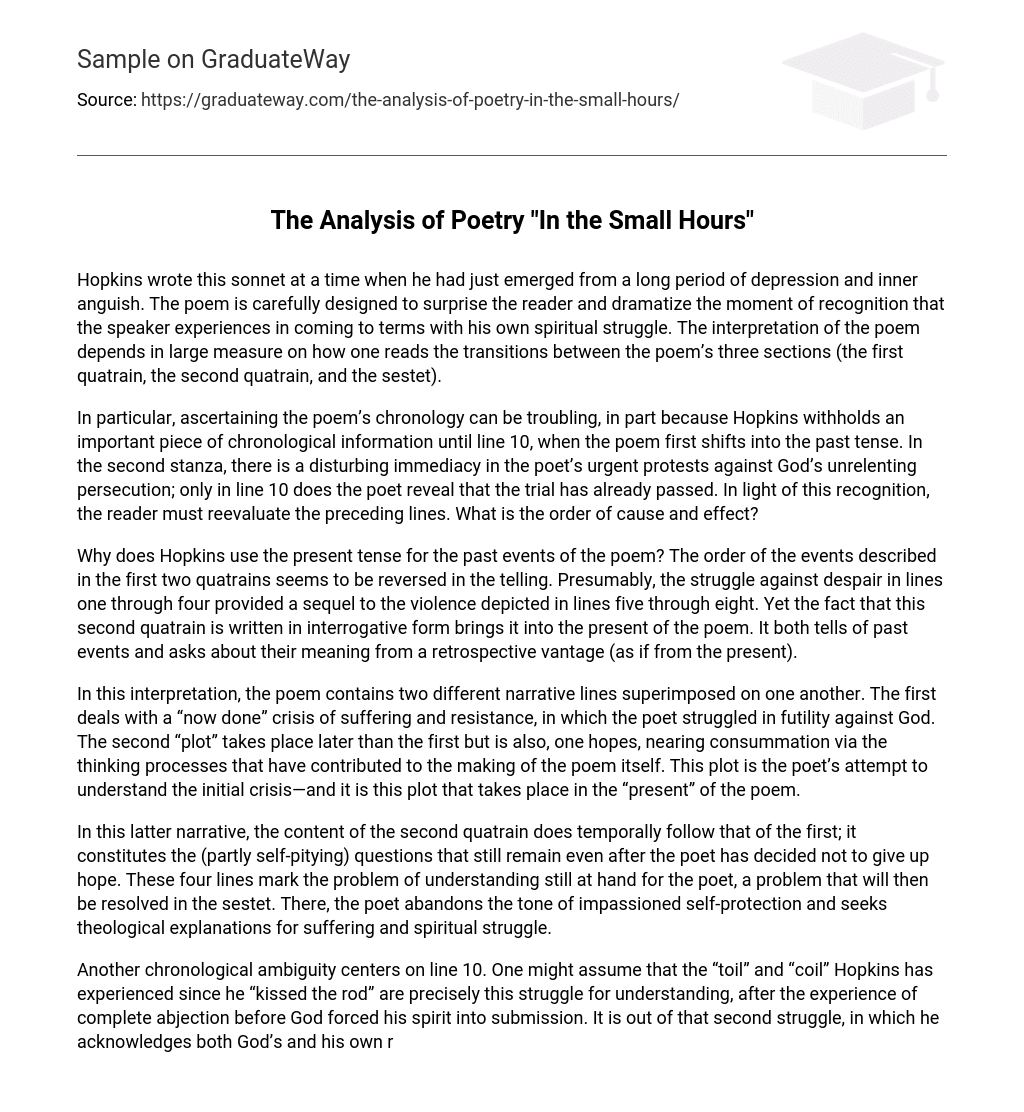Hopkins wrote this sonnet at a time when he had just emerged from a long period of depression and inner anguish. The poem is carefully designed to surprise the reader and dramatize the moment of recognition that the speaker experiences in coming to terms with his own spiritual struggle. The interpretation of the poem depends in large measure on how one reads the transitions between the poem’s three sections (the first quatrain, the second quatrain, and the sestet).
In particular, ascertaining the poem’s chronology can be troubling, in part because Hopkins withholds an important piece of chronological information until line 10, when the poem first shifts into the past tense. In the second stanza, there is a disturbing immediacy in the poet’s urgent protests against God’s unrelenting persecution; only in line 10 does the poet reveal that the trial has already passed. In light of this recognition, the reader must reevaluate the preceding lines. What is the order of cause and effect?
Why does Hopkins use the present tense for the past events of the poem? The order of the events described in the first two quatrains seems to be reversed in the telling. Presumably, the struggle against despair in lines one through four provided a sequel to the violence depicted in lines five through eight. Yet the fact that this second quatrain is written in interrogative form brings it into the present of the poem. It both tells of past events and asks about their meaning from a retrospective vantage (as if from the present).
In this interpretation, the poem contains two different narrative lines superimposed on one another. The first deals with a “now done” crisis of suffering and resistance, in which the poet struggled in futility against God. The second “plot” takes place later than the first but is also, one hopes, nearing consummation via the thinking processes that have contributed to the making of the poem itself. This plot is the poet’s attempt to understand the initial crisis—and it is this plot that takes place in the “present” of the poem.
In this latter narrative, the content of the second quatrain does temporally follow that of the first; it constitutes the (partly self-pitying) questions that still remain even after the poet has decided not to give up hope. These four lines mark the problem of understanding still at hand for the poet, a problem that will then be resolved in the sestet. There, the poet abandons the tone of impassioned self-protection and seeks theological explanations for suffering and spiritual struggle.
Another chronological ambiguity centers on line 10. One might assume that the “toil” and “coil” Hopkins has experienced since he “kissed the rod” are precisely this struggle for understanding, after the experience of complete abjection before God forced his spirit into submission. It is out of that second struggle, in which he acknowledges both God’s and his own roles in the earlier, more wrenching struggle, that his heart is able to recover. On the other hand, we might read the phrase “since (seems) I kissed the rod” differently.
In light of that puzzling parenthetical “seems,” one might decide that all the violence of the second quatrain has taken place after Hopkins thought he had made his peace with God. In that case, the crux of the theological problem would lie with the inscrutability of a God who would inflict such suffering on even Hopkins, a priest who had devoted his life to God’s service. There is also a way of reading the chronology of the poem more continuously. The punishments in the second quatrain are perhaps inflicted by God in retaliation against the poet’s (insufficient) first resolution against despair.
In this reading, the poem would imply that the conclusions in the first stanza are unacceptable to God—the decision to “not choose not to be” might seem willful and self-regarding, as compared to the humility and prostration before God’s will at which the poet afterward arrives. In this reading, the renewal of questioning in the last lines might look like a further lapse, as the struggle for understanding continues in the poet’s own heart even though he ought to stand in total acceptance of God’s will.
From the beginning, the poem works to contrast active and passive behavior, and to weigh the two against each other. Despair is a kind of extreme passivity, and a serious sin in Christian doctrine. Hopkins graphically dramatizes the difference between this despair on the one hand and some hopeful spiritual activity on the other. In the eighth line we see the speaker as a pile of bones lying “heaped there,” dehumanized, cowering, panicked, and struggling desperately for survival.
The sestet depicts the slow emergence from out of that heap, like an animal rising into a human being: lapping tentatively at strength as though it were restorative water, then seizing joy surreptitiously and, finally, more willfully—with a “laugh” and a “cheer. ” This is the purified heart rising out of the pile of bones, with more agency than in the foregoing image of the wheat being stripped of its chaff by a fortuitous wind. In the self-pitying language of the second quatrain, the speaker was a passive victim.
However, in the later assessment, he decides that he too might deserve some credit for having battled it out with God, even if he felt comparatively helpless at the time. The image of kissing the rod, likewise, involves an act of self-subordination that is nevertheless an act, and not perfectly passive. Not only has this act resulted in a personal purification, but it has also given the speaker something else: a certain measure of joy or contentment. bibliofraphy: http://www. sparknotes. com/poetry/hopkins/study. html





